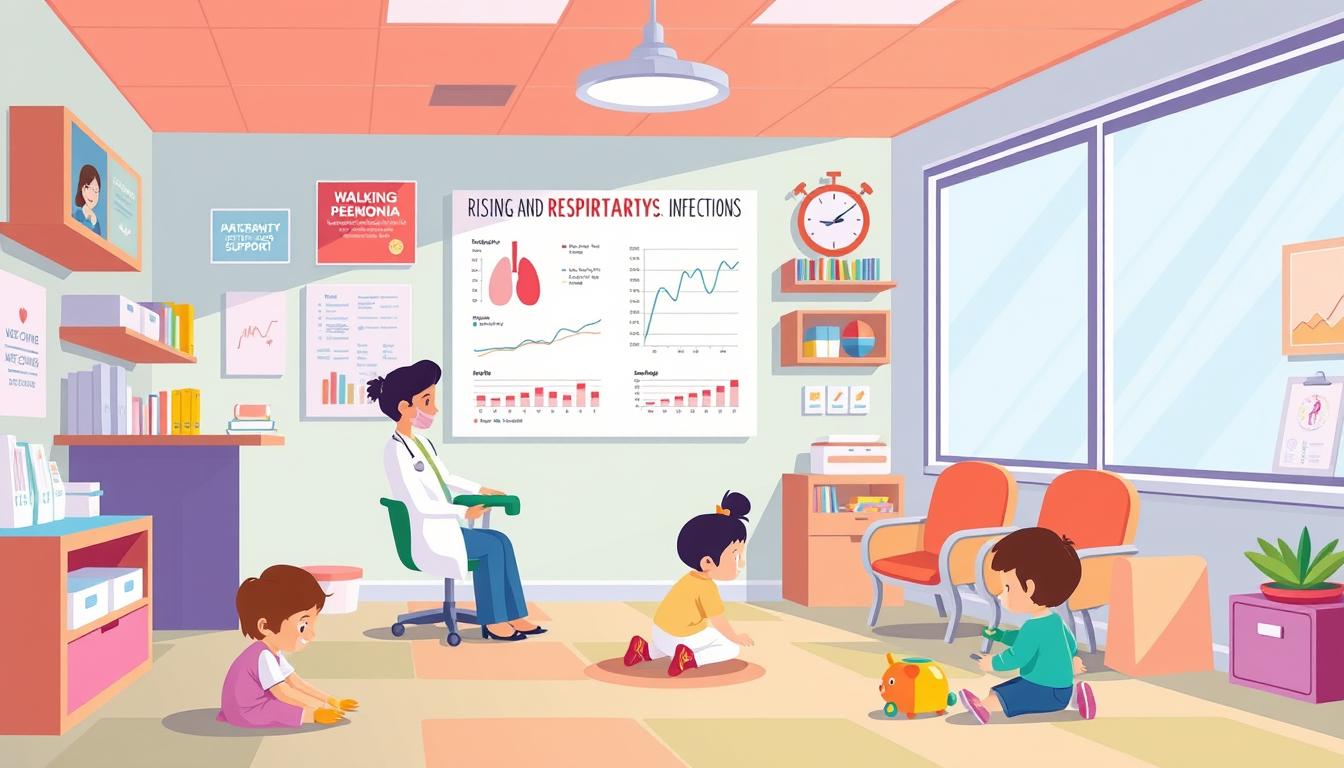Leading neuroscientists have found out how sleep disruption affects the developing brain. They are now focusing on childhood brain development and sleep. They say sleep is key for kids’ brains to grow right.
These studies are very important. They show how not enough sleep can stop brain growth. They also talk about how sleep helps the brain grow. This article will tell you why sleep is so important for kids’ brains.
Key Takeaways
- Sleep disruption significantly affects the developing brain.
- Neuroscientists highlight the importance of adequate sleep for childhood brain development.
- Recent research provides new insights into the cognitive repercussions of sleep deprivation.
- Understanding sleep’s role in brain development can inform better health practices.
- Ensuring proper sleep is crucial for a child’s cognitive and behavioral growth.
Understanding Sleep Disruption
Sleep disruption is a big problem worldwide. It makes it hard to fall asleep, stay asleep, or sleep well. Kids are especially affected because their brains are still growing.
Definition and Causes of Sleep Disruption
Sleep disruption means changes in sleep patterns. It makes it hard to get good sleep. Many things can cause this, like health issues or lifestyle choices. Some main causes of sleep deprivation are:
- Sleep disorders like insomnia or sleep apnea
- Stress and anxiety
- Irregular work schedules
- Lack of a sleep-friendly environment
Being out of sync with the body’s natural rhythm is a big problem. This can happen from working odd hours, not getting enough natural light, or bad sleep habits. It makes it hard to keep a regular sleep schedule.
Common Effects on Daily Life
The effects of sleep deprivation are far-reaching. They can mess up daily life and health. For kids, it’s especially bad because it affects their brains and bodies. Some common effects are:
- Harder to focus and pay attention
- Lower grades in school
- Feeling irritable and moody
- Weaker immune system, leading to more sickness
Grown-ups with sleep issues face similar problems. They might struggle at work and in their personal lives. It’s clear we need to tackle the causes of sleep disruption and its effects to stay healthy.
| Age Group | Common Cause | Common Effect |
|---|---|---|
| Children | Irregular Bedtimes | Academic Struggles |
| Adolescents | Late-night Technology Use | Mood Swings |
| Adults | Work Stress | Reduced Productivity |
The Importance of Sleep in Child Development
Sleep is very important for child development. It helps the brain grow and work well. We need to know how sleep affects brain growth in kids.
Key Stages of Brain Development
Children’s brains change a lot. There are important stages:
- Infancy: The brain grows fast and makes new connections.
- Early Childhood: Kids learn to move, talk, and act like others.
- Adolescence: The brain changes a lot, helping with decisions and control.

Good sleep is key at each stage. For babies, sleep helps make brain connections. As kids get older, sleep helps them learn and remember.

Designed brain development is a complex process that unfolds over several key stages, beginning in the prenatal period and continuing into early adulthood.
During the first few years of life, the brain undergoes rapid growth, forming neural connections at an astonishing rate. This period is crucial for cognitive and emotional development, as experiences shape the brain’s architecture. Factors such as nutrition, environment, and social interactions greatly influence how the brain develops, establishing the foundation for future learning and emotional health.
The development of the brain is a complex and dynamic process that unfolds through several key stages, each pivotal for shaping how we think, feel, and interact with the world. In infancy, the brain undergoes rapid growth, establishing crucial connections that lay the foundation for future learning and development. During this stage, sleep plays a vital role, not just for rest but for consolidation of memories and skills. This early phase is marked by a burgeoning network of neural pathways, a process that is heavily influenced by the quality and quantity of sleep, which facilitates critical brain connections.
As children transition into their school years, the brain continues to mature, and the need for restorative sleep remains paramount. Sleep helps support cognitive functionsBrain development is a complex journey that unfolds through various key stages, each crucial in shaping cognitive abilities, emotional regulation, and social skills. From infancy through adolescence, the brain undergoes immense growth and restructuring, influenced by both genetic factors and environmental stimuli. During the early years, crucial connections between neurons are formed at an extraordinary pace, and experiences during this period lay the foundation for future learning and behavior. As children transition into their teenage years, the brain continues to develop, particularly in areas responsible for decision-making, impulse control, and emotional processing.
In recent years, scientists have placed increasing emphasis on the impact of sleep disruption on the developing brain. Evidence reveals that many teenagers experience circadian rhythm disruption due to lifestyle factors, such as late-night screen time. This phenomenon not only jeopardizes their daily functioning but can also have long-lasting effects on cognitive performance and emotional well-being. Researchers emphasize that insufficient sleep during these formative years can hinder academic success and social interactions, raising concerns about the trajectory of brain development.
The adolescent brain exhibits increased sensitivity to external factors, highlighting the importance of creating an environment conducive to healthy development. As teenagers navigate heightened social pressures and academic demands, their brains are simultaneously undergoing significant physiological changes. Sleep, being integral to cognitive function and emotional stability, plays a critical role in this transition. Studies have shown that adequate rest enhances memory consolidation and promotes resilience in the face of challenges, which is especially vital during such a turbulent period of life.
Understanding the key stages of brain development, particularly the importance of sleep during adolescence, is essential for parents, educators, and policymakersBrain development is a complex and dynamic process that unfolds in distinct stages, each integral to shaping cognitive, emotional, and social capabilities. From infancy to adolescence, the brain undergoes rapid growth, forming billions of neural connections. These formative years lay the foundation for how individuals will perceive, interact with, and respond to the world around them. Scientists have identified critical periods during which the brain is particularly receptive to environmental stimuli, underscoring the importance of nurturing experiences in early life.
One of the crucial elements impacting brain development is sleep. Research has shown that restorative sleep plays a pivotal role in consolidating memories, regulating emotions, and facilitating overall cognitive function. Scientists reveal the impact of sleep disruption on the developing brain, highlighting how inadequate sleep during these formative stages can lead to deficits in learning and social interactions. In a world filled with distractions and the pressures of academic performance, ensuring that children receive sufficient, quality sleep is paramount.
Developing a deeper understanding of the interplay between sleep and brain development not only informs parents and educators but also emphasizes the need for broader societal changes. Communities can promote healthier sleep habits by fostering environments that prioritize rest, including flexible school schedules and awareness campaigns about the significance of sleep hygiene. By advocating for these changes, we can support a culture that values mental well-being in conjunction with physical health, ultimately nurturing resilient individuals.
In conclusion, recognizing the key stages of brain development, alongside the critical role of sleep, offers a comprehensive perspective on how best to support children and adolescents. By encouraging cooperative efforts in promoting awareness about the significance of restorative sleep, we can foster an environment where the developing brain thrives, optimizing both academic performance and social engagement. As we strive to create supportive frameworks, we will empower the next generation to reach their full potential.Brain development is a complex process that unfolds in distinct stages, each critical for shaping an individual’s cognitive and emotional skills. From early prenatal development to adolescence, the brain undergoes a series of transformations that are influenced by both genetic factors and environmental experiences. During the early years of life, neural connections are rapidly formed, laying the groundwork for later skills such as language acquisition, problem-solving, and emotional regulation. The importance of a nurturing environment cannot be overstated, as positive interactions and proper stimulation can significantly enhance the developing brain’s growth.
As we progress toward the later stages of brain development, particularly during adolescence, we see a shift in how neural pathways are refined. The brain undergoes a process called pruning, where excess neurons and synapses are eliminated to optimize its function. This period is crucial, as it is linked to enhanced cognitive efficiency but also heightened vulnerability to mental health issues. During this time, the impact of external factors becomes even more pronounced, and lifestyle choices, such as sleep patterns, play a decisive role in shaping brain health. Recent studies have shown that inadequate sleep can disrupt the fine-tuning processes that occur during these stages, underlining the critical need for proper sleep hygiene.
Scientists reveal the impact of sleep disruption on the developing brain, revealing that a lack of restorative sleep can hinder memory consolidation and emotional regulation, leading to various long-term effects. Children and teenagers who fail to achieve sufficient sleep may experience declines in academic performance, increased irritability, and difficulties in social settings. This makes it imperative for caregivers, educators, and policymakers to prioritize sleep as a vital component of healthy brain development. By fostering an environment that encourages good sleep habits, we can better support children and adolescents as they navigate the complexities of growing up.
In conclusion, understanding the key stages of brain development allows us to recognize the profound impact our environments can have on future generations. From prenatal care to promoting healthy sleep practices, every effort we make to create supportive frameworks can empower the next generation to reach their full potential. By emphasizing the importance of a holistic approach that considers both cognitive and emotional well-being, we can help cultivate resilient individuals equipped to thrive in an ever-changing world.
. By recognizing the detrimental effects of disrupted sleep patterns, there is an opportunity to advocate for healthier habits that support the overall well-being of young people. Encouraging balanced lifestyles, setting boundaries around technology use, and promoting awareness about the significance of restorative sleep can foster an environment where the developing brain thrives, optimizing both academic performance and social engagement.
such as attention span, problem-solving, and emotional regulation. For adolescents, brain development takes on new dimensions, particularly in areas associated with decision-making and impulse control. This period, often referred to as adolescent brain development, is characterized by significant changes in both structure and function, making adequate sleep essential. Unfortunately, many teenagers experience circadian rhythm disruption due to lifestyle factors, such as late-night screen time, which can adversely affect their ability to perform academically and socially.
Moreover, the effects of sleep deprivation during these critical developmental years can be far-reaching. Insufficient sleep can lead to cognitive deficits, impaired judgment, and increased stress levels, all of which complicate the already intricate process of adolescence. It is well documented that inadequate sleep not only hinders academic achievement but also impacts mental health, contributing to issues such as anxiety and depression. The intersection of sleep and brain development underscores the importance of fostering healthy sleep habits from a young age.
Promoting good sleep practices across all stages of development is crucial for optimal brain health. As children and adolescents navigate through these transformative years, understanding the effects of sleep deprivation and circadian rhythm disruption can empower parents, educators, and young individuals themselves to prioritize sleep as a foundational pillar of overall well-being. Building awareness around these issues can lead to better strategies for ensuring that the brain has the necessary time to grow, adapt, and thrive.Brain development is a complex process that unfolds in several key stages, each marked by critical transformations that shape cognitive, emotional, and physical abilities. From prenatal stages through early childhood, brain architecture is molded by a combination of genetic predispositions and environmental influences. As recent research has underscored the importance of sleep in this developmental journey, scientists reveal the impact of sleep disruption on the developing brain can be profound, particularly in early years when rapid growth occurs.
Sleep deprivation effects during these formative stages are particularly concerning. Insufficient sleep can interfere with essential processes like memory formation, learning, and emotional regulation, potentially leading to long-term consequences. Children who experience chronic sleep issues may struggle academically and socially, exhibiting behaviors that reflect impaired cognitive functions. Given the high stakes associated with these challenges, it is critical to explore effective prevention strategies to assure that children receive the restful sleep they need for optimal brain function.
Creating a conducive sleep environment is one of the most vital prevention strategies. This includes establishing consistent bedtime routines, minimizing screen time before bed, and ensuring that sleeping areas are dark and quiet. Additionally, educating parents and caregivers about the significance of sleep can empower them to prioritize their child’s sleep needs. Being proactive in these ways can foster better sleep hygiene, which in turn supports healthy brain development and overall well-being.
As research continues to advance, it becomes increasingly evident that nurturing the developing brain requires a holistic approach that encompasses sleep as a fundamental component. Building awareness around these issues not only enhances our understanding of brain development but also encourages society to adopt practices that safeguard the sleep of children. By championing healthy sleep habits, we can provide the brain with the necessary time to grow, adapt, and thrive, ultimately laying the groundwork for a healthier future generation.Brain development is a complex process that occurs in distinct stages, each crucial for a child’s cognitive, emotional, and social growth. During infancy, the brain undergoes rapid changes, forming synaptic connections at an astonishing rate. As children transition into early childhood, the brain’s structure continues to evolve, allowing for improved reasoning and problem-solving skills. This period is pivotal, as it lays the foundation for future learning and development. Scientists have found that factors such as sleep play a significant role in these early stages, highlighting the need for awareness about the impact of sleep disruption on the developing brain.
Recent research has shown that childhood sleep disorders can have far-reaching consequences, interfering with overall development and even academic performance. When children experience poor sleep quality or insufficient sleep, their cognitive functions may be hampered, leading to difficulties in concentration and emotional regulation. Scientists reveal the impact of sleep disruption on the developing brain, suggesting that restorative sleep is essential for memory consolidation and the processing of information. Thus, establishing healthy sleep patterns from an early age is crucial to support optimal brain development and overall well-being.
To foster better sleep among children, parents can adopt effective sleep hygiene tips. Creating a consistent bedtime routine, ensuring a comfortable sleep environment, and limiting screen time before bed can significantly enhance sleep quality for young ones. Encouraging relaxation techniques, such as reading or gentle stretching, can also help children wind down in preparation for sleep. By implementing these strategies, parents can help their children navigate the various stages of brain development more effectively, ensuring that their growing minds are well-rested and ready to engage with the world around them.
Promoting healthy sleep habits is not just a matter of ensuring our children get enough rest; it is about providing the brain with the necessary time it needs to grow, adapt, and thrive. With a strong emphasis on good sleep hygiene, we can lay the groundwork for a healthier future generation, empowering them to reach their full potential. In doing so, we are not only nurturing their developing brains but also contributing to their physical health, emotional stability, and intellectual success in the long run.Brain development is a complex process that unfolds in distinct stages, each critical for our cognitive, emotional, and physical well-being. From the early formation in the womb to the significant changes that occur during adolescence, each phase serves to shape the intricate neural pathways that govern how we think, feel, and interact with the world around us. Scientists have dedicated years to understanding how various factors, including nutrition, stimulation, and environmental conditions, contribute to the brain’s growth and functional capacity, shedding light on the unique needs of each developmental stage.
One area of considerable interest in the field of neuroscience is the impact of sleep on brain development. Studies indicate that sleep plays a vital role in the maturation of the brain, affecting everything from memory consolidation to emotional regulation. Scientists reveal the impact of sleep disruption on the developing brain, highlighting that inadequate sleep can hinder cognitive processes and impair emotional health. As children grow, the need for quality sleep becomes increasingly important, not just for physical recovery but for optimal brain functionality. Disruption during critical stages—like infancy, childhood, and adolescence—can lead to lasting deficits in learning and behavior.
Furthermore, the interplay between genetics and environment during the key stages of brain development cannot be overstated. Children are particularly sensitive to their surroundings; nurturing environments that promote exploration, social interaction, and learning can enhance cognitive abilities, whereas stressful or neglectful conditions may have detrimental effects. This points to the crucial need for supportive, enriching environments that foster brain health, particularly during formative years when the brain is most adaptable and receptive to change.
As we forge ahead in understanding the complexities of brain development, it becomes increasingly clear that prioritizing factors such as sleep, nutrition, and a stable environment is essential for the well-being of future generations. By giving these issues the attention they deserve, we not only enhance the potential of young minds but also lay the groundwork for a healthier, smarter, and more emotionally resilient society. The ongoing research and discoveries in neuroscience will undoubtedly continue to shape our approach to nurturing the developing brain, ensuring that we can unlock and support their full potential.Brain development is a complex process that unfolds in distinct stages, each critical for forming the structures and functions necessary for cognitive, emotional, and social skills. From prenatal stages through early childhood, the brain undergoes significant growth, characterized by the formation of neural pathways and synapses that facilitate learning and memory. During this time, various external factors, such as genetics, environment, and nutrition, play a pivotal role in shaping an individual’s cognitive abilities and emotional resilience. As we understand more about these key stages of brain development, we recognize the importance of providing supportive environments that foster healthy brain growth.
Recent studies emphasize the profound influence that sleep has on brain development, particularly during the early years when the brain is most adaptable. Scientists reveal the impact of sleep disruption on the developing brain, highlighting how inadequate sleep can hinder cognitive functions, attention, and memory retention. During sleep, crucial processes such as consolidation of memories and synaptic pruning occur, which are essential for efficient brain functioning. This understanding underscores the necessity for caregivers and educators to prioritize sleep hygiene for children, ensuring they receive the restorative rest required for optimal brain development.
In addition to sleep, the role of stimulating activities cannot be overstated. Engaging children in interactive play, reading, and problem-solving tasks fosters the creation of neural connections that are vital for cognitive growth. As the brain develops, it becomes increasingly specialized, requiring diverse experiences to build a robust neural network. Neuroscientific insights suggest that promoting a variety of learning opportunities during critical periods can significantly impact long-term cognitive outcomes, setting the stage for lifelong learning.
As our understanding of brain development deepens, we are better equipped to create environments that nurture young minds. The ongoing research and discoveries in neuroscience will undoubtedly continue to shape our approach to nurturing the developing brain, ensuring that we can unlock and support their full potential. By recognizing the importance of factors such as sleep and active engagement, we can collectively contribute to fostering a generation of individuals equipped to navigate the complexities of the world.
As children grow, their brains continue to mature through critical periods marked by heightened plasticity. During these times, certain skills, such as language acquisition and emotional regulation, can be significantly impacted by external influences. Recent studies show that scientists reveal the impact of sleep disruption on the developing brain, indicating that adequate sleep is vital for consolidating memories and fostering learning. Disruptions to sleep patterns can hinder the brain’s ability to process information and develop essential cognitive functions, leading to long-term consequences.
In adolescence, the brain undergoes a second wave of structural changes, particularly in the prefrontal cortex, which is responsible for decision-making, impulse control, and complex thought processes. This stage highlights the importance of emotional support and healthy coping mechanisms as young individuals face an array of social and academic pressures. As teenagers navigate these challenges, fostering resilience through supportive environments can enhance their capacity for well-being and academic success.
Finally, brain development continues into the mid-20s, with refining neural pathways and pruning unnecessary connections. This ongoing maturation phase allows for improved problem Brain development is a complex and fascinating journey that occurs in distinct stages throughout early life. From the prenatal period to adolescence, the brain undergoes rapid changes that shape cognitive abilities, emotional regulation, and social interactions. In the early stages, a high number of neurons and synapses are formed, laying the foundation for future learning and memory. During this time, the environment plays a crucial role, and experiences—both positive and negative—can significantly influence neural connections. The interplay between genetics and environment during these formative years is essential for optimal brain maturation.
Recent research has brought attention to the significance of sleep in the development of the young brain. Scientists reveal the impact of sleep disruption on the developing brain, highlighting how inadequate rest during critical growth phases can impair cognitive functions and emotional health. Children and adolescents require ample sleep for memory consolidation and emotional stability, leading to better academic performance and interpersonal relationships. The lack of sufficient sleep not only affects short-term cognitive tasks but can also have lasting consequences on mental health and resilience as individuals grow.
Moreover, the ongoing developments in brain imaging technologies have allowed researchers to uncover the intricacies of brain maturation. They have identified key windows of opportunity where intervention, whether through education or therapeutic practices, can have meaningful effects on a child’s future potential. This understanding emphasizes the necessity of creating supportive environments that promote healthy brain development, which includes ensuring adequate sleep, nutrition, and positive social interactions.
As we continue to explore the nuances of brain development, it becomes increasingly clear that nurturing emotional well-being is paramount. By prioritizing factors that positively influence brain health, such as healthy sleep habits and enriching environments, we can help cultivate resilient individuals equipped to thrive in an ever-changing world. Ensuring that children have the tools necessary to navigate future challenges with confidence will not only serve them well throughout life but also contribute to the overall health of society.
solving and emotional regulation, enabling young adults to tackle the complexities of life more effectively. By emphasizing the importance of a holistic approach that considers both cognitive and emotional well-being, we can help cultivate resilient individuals equipped to thrive in an ever-changing world, ensuring they have the tools necessary to navigate future challenges with confidence.
The Role of Sleep in Learning and Memory
Studies show sleep is key for learning and memory. Sleep helps move new info from short-term to long-term memory. This makes kids smarter and do better in school.
Research says sleep helps kids keep learning from the day. Kids who sleep well do better in school. They pay attention better and solve problems easier. Sleep is especially important for teens, helping their brains grow and learn.
| Stage of Development | Critical Sleep Function | Impact if Deprived |
|---|---|---|
| Infancy | Neural growth and synaptic formation | Cognitive delays and impaired basic functions |
| Early Childhood | Development of motor skills, language, and social behaviors | Reduced motor coordination and delayed language skills |
| Adolescence | Prefrontal cortex restructuring | Poor decision-making and impulse control |
Understanding sleep’s role in development shows why kids need enough sleep. It helps them grow smart, emotionally, and in school.
New Findings from Recent Research Studies
Many recent studies have shown how sleep affects the growing brain. These studies used different methods and looked at different groups. They show how wide the research on sleep disruption is.
Overview of Recent Research
Studies used many ways to study sleep and brain growth. They watched how sleep and brain work change in kids and teens. Schools like Harvard Medical School led these studies.
Key Results and Their Implications
Studies found sleep problems hurt brain work. Kids with bad sleep did worse in school. They also found sleep issues can lead to anxiety and depression.
This news is important for parents, teachers, and leaders. Parents should help kids sleep well. Teachers can ask for later school times. Leaders need to help schools and communities sleep better.
| Study | Methodology | Key Findings |
|---|---|---|
| Harvard Medical School | Longitudinal Cohort | Sleep disruption linked to cognitive impairment |
| Stanford University | Cross-Sectional Survey | Improper sleep patterns increase mental health risks |
Long-Term Consequences of Sleep Disruption
Studies show sleep problems in kids can really hurt their brains and behavior. These issues can last into adulthood. It’s important to fix these problems early to avoid big health problems later.
Cognitive Effects in Childhood
Kids’ brains grow a lot, and sleep helps a lot with this. If kids don’t sleep well, they might not learn as fast. They might also have trouble remembering things.
This can make it hard for them to do well in school. It can also affect how smart they can become.
Behavioral Health Outcomes
Sleep also affects how kids feel and act. Not sleeping enough can make kids moody and restless. It can also lead to anxiety.
Studies say kids who don’t sleep right are more likely to have mental health problems. They might also have trouble making friends and getting along with others.
It’s very important to make sure kids get enough sleep. We need to keep studying how sleep affects kids’ brains and behavior.
| Key Impact Areas | Observed Effects | Long-Term Consequences |
|---|---|---|
| Cognitive Processing | Slower speeds, reduced attention | Learning difficulties, poor memory retention |
| Mood Regulation | Irritability, hyperactivity | Anxiety, mental health issues |
| Social Interactions | Poor social skills | Challenges in peer relationships |
Practical Tips for Promoting Healthy Sleep
Helping kids sleep well is key for their growth. Tips like a cozy sleeping space and regular sleep time help a lot. They make sure kids sleep well and feel good.
Establishing a Consistent Sleep Schedule
Keeping a regular sleep time is a big help. Doctors say a set bedtime and wake-up time, even on weekends, is best. It helps kids sleep and wake up better.
Starting a bedtime routine is also good. Reading, taking a warm bath, or relaxing can tell the brain it’s time to sleep. This makes it easier to stick to a sleep schedule.
Creating a Sleep-Friendly Environment
A good sleeping space is very important. The National Sleep Foundation says it should be dark, quiet, and cool. Using blackout curtains, white noise, and fans can make it perfect.
Also, not using screens before bed and making the bed only for sleep helps a lot. These tips make a sleep-friendly place for kids to rest well.
| Strategies | Recommendations |
|---|---|
| Consistent Sleep Schedule | Fixed bedtime and wake-up time, Pre-sleep routines |
| Sleep-Friendly Environment | Dark, quiet, and cool room, Limit screen time, Comfortable bed |
Moving Forward: The Need for Further Research
The link between sleep and brain growth is still a mystery. Even with big steps forward, there’s a lot we don’t know. Especially about sleep problems in kids.
We need more research to understand how sleep shapes the brain. This is very important.
Identifying Gaps in Current Research
Studies have given us some answers, but they’re not enough. We don’t know how sleep problems affect kids’ minds and feelings over time. Also, we don’t look at how genes and the environment mix to affect sleep.
Future Directions for Studies on Sleep and the Brain
We need a team effort to move forward. Experts from many fields should work together. This will help us learn more.
We should watch kids over time to see how sleep affects them. New tools and tests can help us see how sleep changes the brain. Working together, we can use this knowledge to help kids sleep better.


